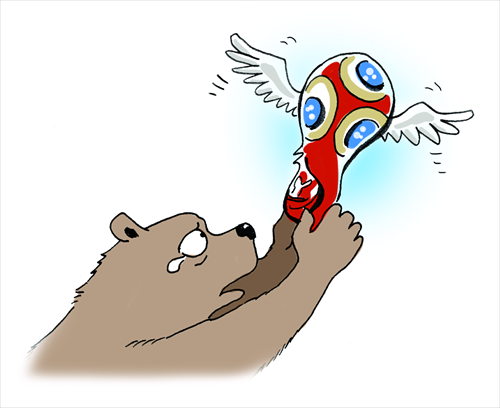HOME >> OP-ED
FIFA scandal sparks Cold War fears among anxious Russian public
By Yang Jin Source:Global Times Published: 2015-6-16 23:53:01

Illustration: Liu Rui/GT
Since May, corruption scandals within the Fédération Internationale de Football Association (FIFA) have been constantly exposed. As evidence of widespread corruption has mounted, long-time FIFA head honcho Sepp Blatter was forced to offer to resign, though he is still clinging onto office. How the scandals will evolve has attracted intense public interest. One particular uncertainty is whether Russia will lose the 2018 World Cup.
In 2010, Russia won the 2018 World Cup bidding. But if evidence emerges of bribery, it could lose the right to host the grand football match.
Russian media have shown concerns about this matter. Figures from the sports world as well as political circles have rebuked the alleged bribery. A Russian official has claimed that even though there is corruption within FIFA, it only concerns a few individual FIFA officials and has nothing to do with Russia's right to host the 2018 World Cup.
Conspiracy theories prevail in Russia. Some believe the investigation into the world's football governing body and rumors that Russia may lose the World Cup are Western plots. They hold that Western countries are set to insult Russia by using the FIFA corruption scandal, hoping to see Russia's previous investment into the sporting event wasted.
There is little evidence to back such speculation. But no matter whether such theories can be vindicated or not, it reflects Russian society's understanding of the Western world.
International sporting events used to be a Cold War battleground. In the 1980 Moscow Olympic Games, Western countries led a boycott of the games by not sending their leaders or athletes so as to embarrass the then Soviet government in response to the Soviet Union's invasion of Afghanistan.
The Western criticisms of the 2014 Sochi Winter Olympic Games are perhaps still fresh in the Russian people's memory. The collective absence of Western leaders at this winter event once again made Russia feel the bitterness of being isolated and resisted by the West.
Currently, Russia and the Western world are facing the most severe confrontation since the Cold War, and the series of corruption scandals involving FIFA are an interlude.
Despite the fact that the World Cup is sports event and appears to have nothing to do with politics, it cannot shield itself away from politics, especially when Russia and the West are at a sensitive point.
Therefore, when Western countries conduct a relentless crackdown on FIFA corruption and hint at the possibility of canceling Russia's right to host the 2018 World Cup, the conspiracy theory in Russia does not arise out of nothing. In the eyes of Russians, corruption within FIFA is nothing new, but the current tough fixation on FIFA is just an excuse to punish their country.
Since the outbreak of the Ukrainian crisis last year, the relationship between Russia and the West has almost disintegrated. The fragile mutual trust accumulated throughout the years has vanished. Due to the complexity of the Ukrainian crisis, it cannot be solved in the foreseeable future. This means relations between Russia and the West will remain tough.
Therefore, the rivalry between the two sides will be an all-out one. Besides the traditional domain of rivalries in international politics, sports can also serve as a platform for confrontation. Once the allegations of FIFA corruption are proved, the West will spare no efforts to tarnish the image of Russia. The struggle over World Cup games is just the tip of the iceberg in bilateral political rivalries.
The author is an associate research fellow of the Institute of Russian, Eastern European, Central Asian Studies at the Chinese Academy of Social Sciences. opinion@globaltimes.com.cn
Posted in: Viewpoint